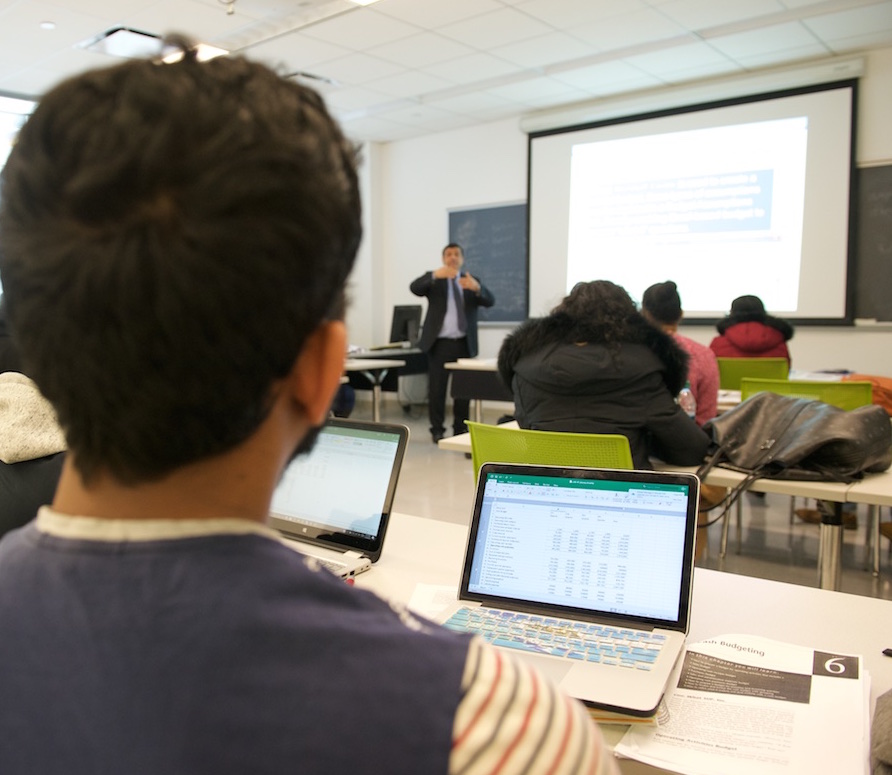
“Accountants are no longer bean counters,” says Josh Wolfson, Chair of the Borough of Manhattan College (BMCC/CUNY) Accounting Department. “They must also have a skill set that includes effective oral and written communication.”
The Accounting Department’s five-year Academic Program Review (APR), a self-assessment process, “speaks to the comprehensive skill set required of accountants,” Wolfson says. “We are trying to implement oral presentations, as well as written reports, into every accounting course. Intertwined with the public speaking activities is the students’ growing proficiency in Excel, an essential tool for accountants today.”
Applying communication and Excel skills to concepts of accounting
While every Accounting major takes a Speech class, “additional communication focus in every accounting class will help students develop their speaking and reporting skills alongside their understanding of the fundamentals of accounting,” Wolfson says. “Accountants deliver the meaning of collected data across departments and to all levels of stakeholders. This eventually informs decisions about the direction a company is headed.”
Likewise, he says, “while the students take a stand-alone Excel class, we want them to apply this software program—which is the industry standard for data collection and analysis—in the context of accounting concepts they are studying.”
The end result is that students will realize “Excel spreadsheets are not simply a place to store data,” he says. “Accountants use Excel to track and predict trends in investing, sales and other aspects of revenue building. Filtering data enables them to evaluate patterns from different perspectives, and that’s a valuable tool for making fiscal decisions.”
Students gain confidence for future roles
BMCC graduates with Associate degrees in Accounting or Forensic Accounting are eligible to apply for entry-level jobs in the industry. Many also continue their higher education by transferring to a bachelor’s degree program that qualifies them to take the Certified Public Accounting (CPA) exam.
A focus on communication skills and contextualized Excel learning supports the Accounting graduates’ diverse paths.
“When you’re sitting with clients, advising them on investments, you need to communicate clearly,” says Accounting major Victor Soohoo. “Just hearing the word ‘debt’ can make people stress out, but if the accountant clearly explains options and presents a budget plan, you can offset those negative emotions.”
Along with communication skills, “Excel is a versatile tool,” Soohoo says. “In a corporate setting, you can create reports and make data projections that enable shareholders to understand where the company is going and whether their investment decisions are making a profit.”
From the perspective of Accounting major Sivika Persaud, “Using Excel in class projects like the cash budget report we just presented gives me real-world experience. We focused on all the functions of Excel, not just the basic ones. It’s the kind of report I’ll be generating to predict earnings and spending for a company someday.”
As for presenting her budget reports in class, “I’m getting more comfortable with that part,” Persaud says. “Especially as a woman heading into a male-dominated industry, it’s important for me to practice showcasing my talent, and speaking out. This class gives me the confidence to do that.”
STORY HIGHLIGHTS
- The Accounting Department’s five-year Academic Program Review (APR), addresses the communication skills required of accountants
- The department is also integrating Excel learning into every course
- Students take Excel and Speech courses, but now they will reinforce those skills in the context of accounting concepts

